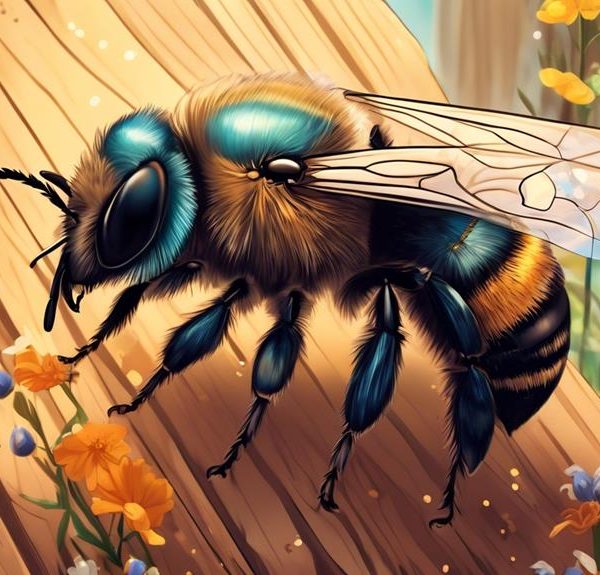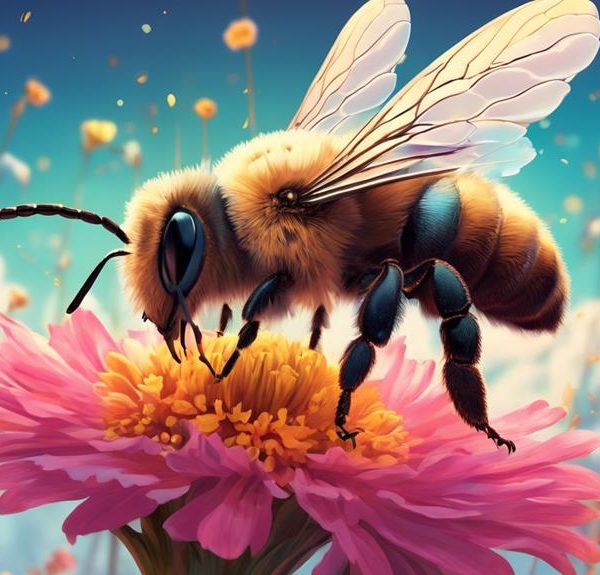Wondering if mason bees are the next sustainable superfood? Explore the nutritional, ethical, and potential risks of this intriguing prospect.
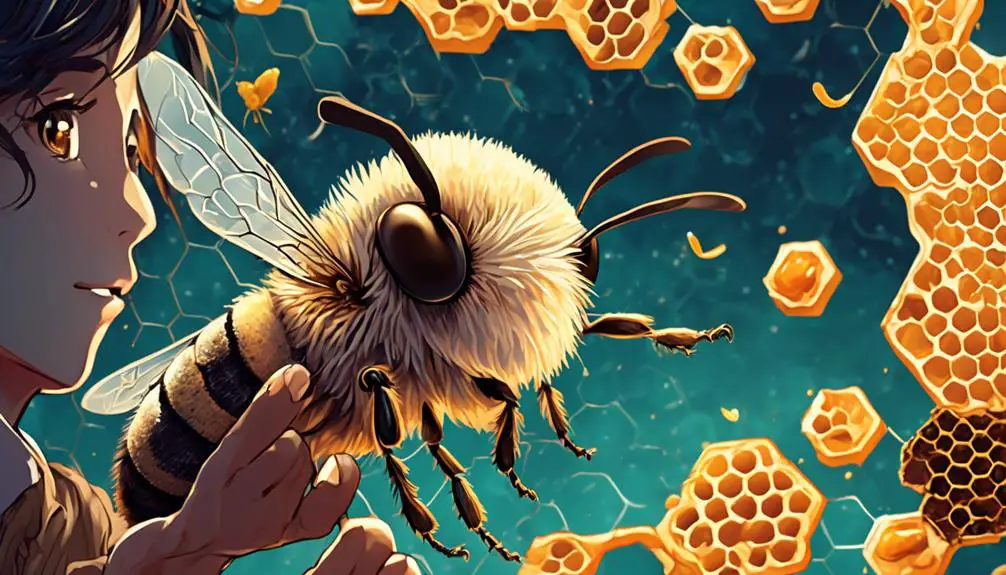
Are Mason Bees Edible
You've probably heard about the rise of edible insects as a sustainable source of protein, with everything from crickets to mealworms finding their way into modern culinary dishes.
But have you ever considered the humble mason bee as a potential addition to this list?
As you ponder this question, you may find yourself contemplating the nutritional value of these industrious insects, potential risks associated with consuming them, and even the ethical implications of adding them to our diets.
By examining these factors, you'll be better equipped to form an informed opinion on this intriguing, if somewhat unconventional, topic.
Key Takeaways
- Mason bees are not typically consumed by humans due to their ecological role and small size.
- Eating mason bees would not provide much nutritional benefit due to their small size.
- The removal of mason bees from their natural habitat could disrupt local ecosystems.
- Consuming mason bees could disrupt vital ecological processes and raises ethical concerns about cruelty and exploitation.
Understanding Mason Bees
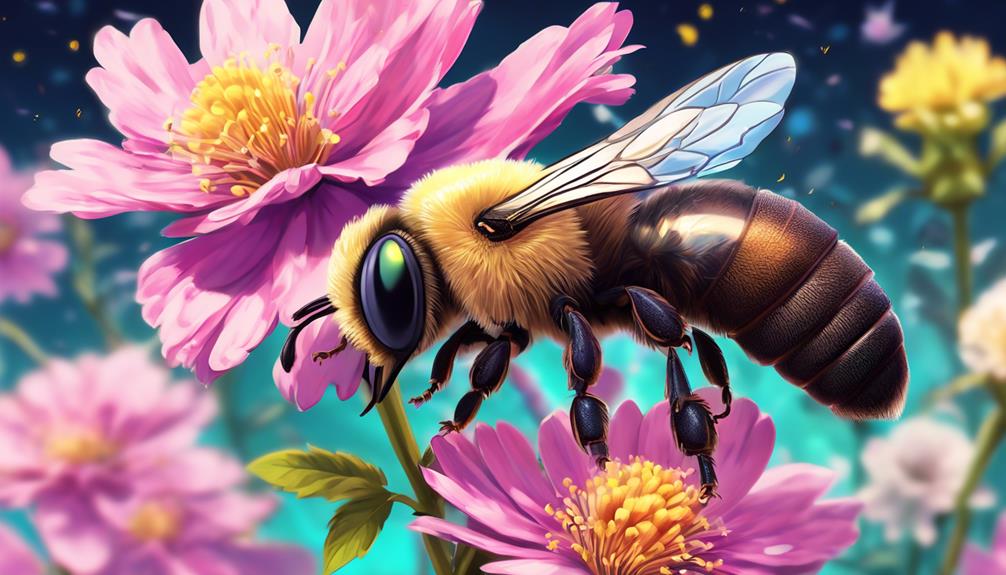
Before you delve into whether mason bees can be eaten, it's crucial to understand what these tiny creatures are, how they function, and their role in our ecosystem.
Mason bees, unlike their more famous relatives, the honeybees, don't produce honey. They're solitary insects, meaning each female bee tends to her offspring independently. These bees are called 'mason' because they use mud or other malleable materials to construct their nests, showcasing an impressive level of craftsmanship.
While you mightn't see them buzzing around your garden as much as honeybees, mason bees play a pivotal role in pollination. They're known as one of nature's most efficient pollinators, with a single mason bee capable of doing the work of 100 honeybees. This means they're instrumental in supporting plant diversity and food production, contributing significantly to our ecosystem's health.
Now you're aware of their importance, you might reconsider whether you still want to know if they're edible. Perhaps, the focus should shift from potential consumption to conservation. After all, these industrious insects contribute more to our plates by pollinating the plants that become our food than they likely would on the plate themselves.
Nutritional Value of Insects
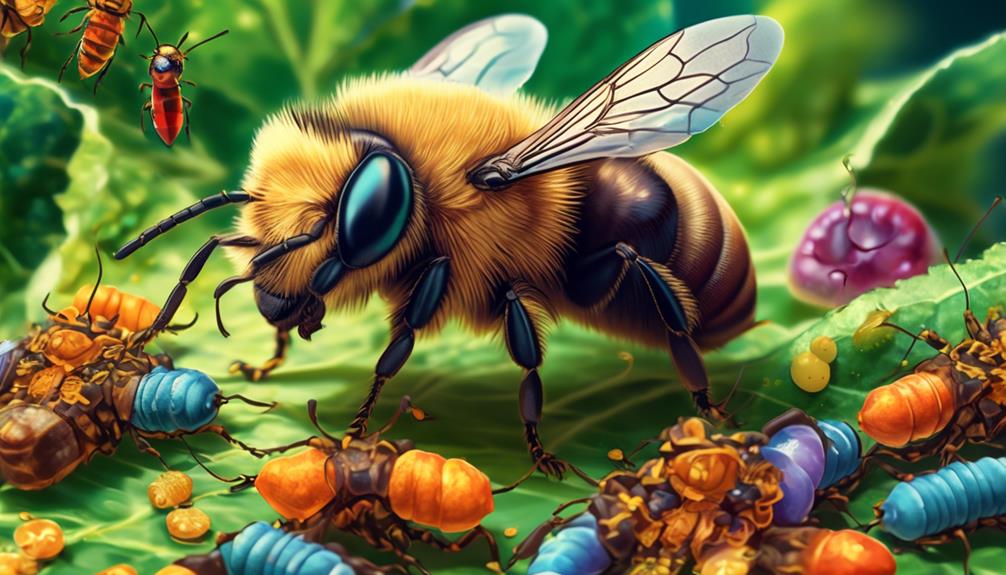
While you may be questioning the edibility of mason bees, it's essential to consider the broader picture, specifically the nutritional value that insects, in general, can offer. Insects are incredibly nutrient-dense, often packing more protein, vitamins, and minerals than traditional meat sources.
Here's a quick comparison of three commonly consumed insects and their nutritional value:
Insect | Protein (g/100g) | Iron (mg/100g) | Zinc (mg/100g) |
|---|---|---|---|
Crickets | 20.5 | 6.0 | 5.5 |
Mealworms | 18.2 | 6.7 | 2.7 |
Silkworms | 16.6 | 3.5 | 2.0 |
This table shows that insects can be a substantial source of essential nutrients. Crickets, for instance, have an impressive protein profile, which is essential for muscle building and repair. They're also a good source of iron and zinc, vital for maintaining energy levels and a healthy immune system.
Edibility of Mason Bees
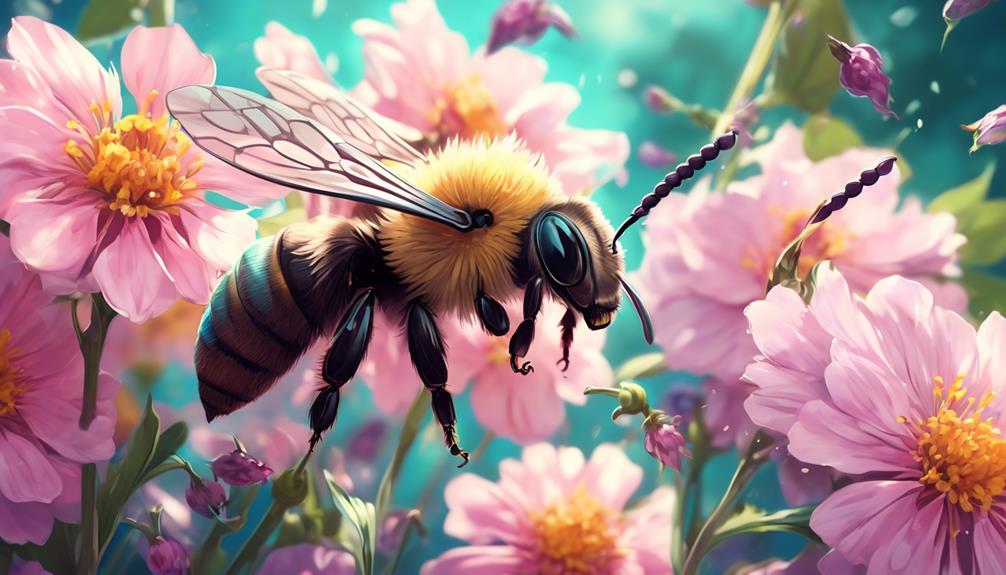
Diving into the edibility of mason bees, it's crucial to understand that these particular insects aren't typically consumed by humans due to their ecological role and relatively small size. Unlike larger insects such as crickets or mealworms, which are often roasted and eaten in various cultures, mason bees are mainly appreciated for their pollination efforts.
You see, mason bees are solitary creatures that play a vital role in our ecosystem. They're excellent pollinators, which means they're more useful alive than on a dinner plate. Their small size also means that eating them wouldn't provide much nutritional benefit.
When considering the edibility of any insect, you should weigh the potential environmental impact. The removal of mason bees from their natural habitat could disrupt local ecosystems, leading to possible negative consequences.
Furthermore, mason bees aren't bred for consumption like some other insects. They're usually found in the wild, which means there's a risk of ingesting pesticides or other harmful substances if they're consumed.
Potential Risks and Considerations
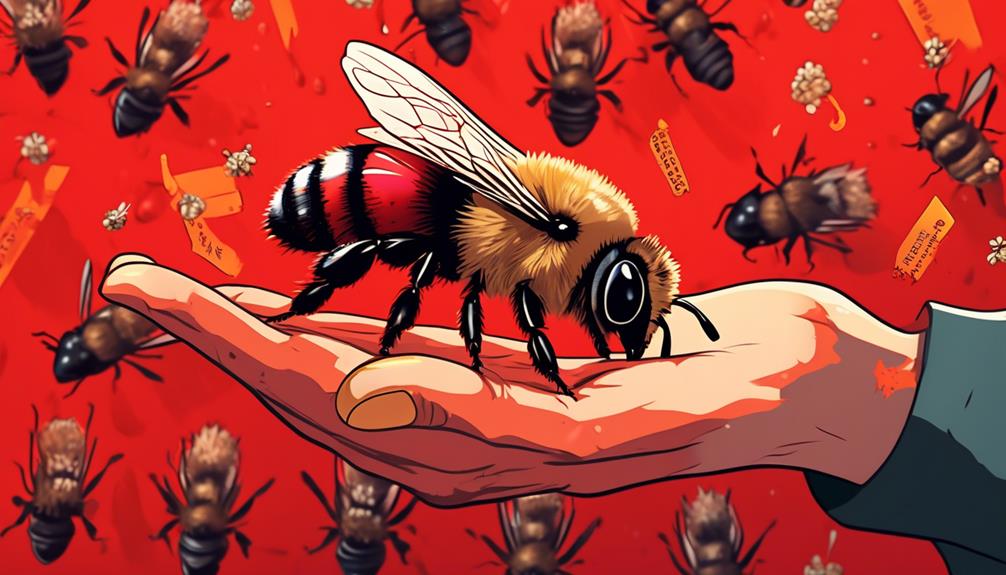
Have you considered the potential risks and implications of consuming mason bees? While some cultures may consider insects a protein-rich food source, there's a lot you should weigh before popping these pollinators into your mouth.
There are several potential risks and considerations to account for. Firstly, potential allergic reactions. Some people might be allergic to insects, and mason bees are no exception. Secondly, hygiene and cleanliness can be a concern. Mason bees, like other insects, can carry bacteria or parasites which could cause disease if not properly cooked. Lastly, the environmental impact. Mason bees are prolific pollinators, and their consumption could disrupt local ecosystems.
To help you understand better, here's a table summarizing the risks and considerations:
Potential Risk | Explanation | Mitigation |
|---|---|---|
Allergic Reactions | Some people may have allergies to insects | Seek medical advice before consuming |
Hygiene and Cleanliness | Mason bees may carry harmful bacteria or parasites | Ensure proper cooking |
Environmental Impact | Mason bees are essential pollinators, consuming them could disrupt ecosystems | Consider alternative protein sources |
Ethical Implications of Eating Bees
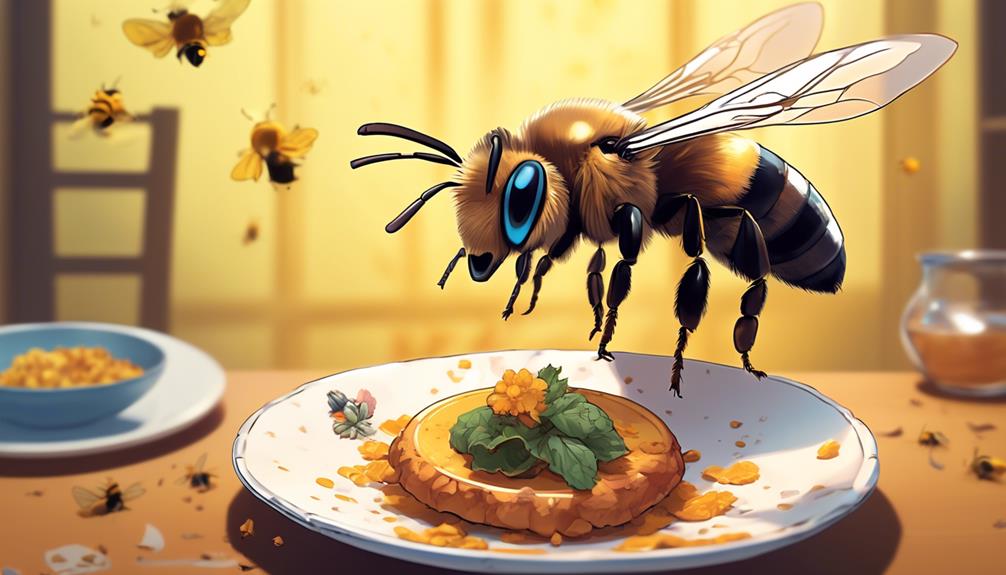
Beyond the potential health risks, you also need to grapple with the ethical dilemma that comes with eating mason bees.
You see, mason bees play a crucial role in our ecosystem. They're one of the world's leading pollinators, crucial for plant reproduction and the overall health of our environment. So, consuming them could disrupt these vital processes and have significant ecological implications.
Moreover, it's worth considering the welfare of these creatures. They're not bred for consumption like livestock. Harvesting them for food raises questions about cruelty and exploitation, especially if it's done without regard to their well-being.
Then there's the issue of sustainability. Given the declining bee population worldwide, it's questionable whether the practice of eating bees can be sustained in the long run without causing irreversible harm to their species and, by extension, our environment.
In light of these ethical implications, you might want to reconsider your dietary choices. There's a wide variety of other protein sources that are both ethically and environmentally sound. You don't have to compromise the well-being of these important insects for the sake of an unusual dietary preference.
Frequently Asked Questions
What Is the Legal Status of Consuming Mason Bees in Various Countries?
You're curious about the legality of eating Mason Bees across different countries. It's not a common practice, and there's no specific legislation addressing it. Most laws focus on the protection and conservation of bees, not their consumption.
However, it's generally accepted you shouldn't eat them. They're vital pollinators, not a food source. Plus, they could potentially carry parasites.
Are There Any Specific Cooking Methods Recommended for Mason Bees?
You're curious about cooking methods for Mason bees, aren't you? Unfortunately, there's no specific cooking methods for them.
They're not typically part of the human diet, and there's little culinary precedent or guidance for their preparation.
It's also crucial to note that eating these pollinators could disrupt ecosystems.
Are There Any Particular Cultures or Societies Known for Consuming Mason Bees?
You're asking if certain cultures or societies are known for consuming Mason bees.
There's no widespread historical or contemporary record of any specific culture that regularly eats these bees. While insects are part of the diet in many regions, Mason bees aren't typically on the menu.
They're cherished more for their pollination abilities. So, it's safe to say that Mason bees aren't a known delicacy in any particular culture or society.
Can Mason Bees Be Farmed for Consumption Purposes?
You're probably thinking about farming mason bees for consumption, aren't you? Well, it's not typically done. Mason bees aren't known to be a source of food for humans. They're primarily kept for their pollination abilities.
Plus, you'd encounter significant challenges trying to farm them for food. They're solitary creatures and don't produce honey or any other food products.
Stick to traditional livestock farming, it's a much safer bet.
What Is the Impact on the Ecosystem if Mason Bees Are Consumed in Large Numbers?
If you were to consume Mason bees in large numbers, it'd severely impact the ecosystem. These bees are key pollinators, aiding plant reproduction. A decrease in their population would disrupt this process, potentially causing plants to die off.
This would have a ripple effect, impacting other species that rely on these plants for survival. So, while they might be physically edible, their consumption would have detrimental ecological consequences.
Conclusion
While Mason bees offer some nutritional value, it's important to consider potential risks. Allergies, toxins, and parasites could pose threats.
Also, ethical considerations arise when consuming bees, given their vital role in our ecosystem. Therefore, even though technically edible, it's best not to make Mason bees part of your diet.
Instead, appreciate their contribution to biodiversity and our planet's health. Eating them isn't just potentially harmful, it's also counterproductive to sustainability efforts.

